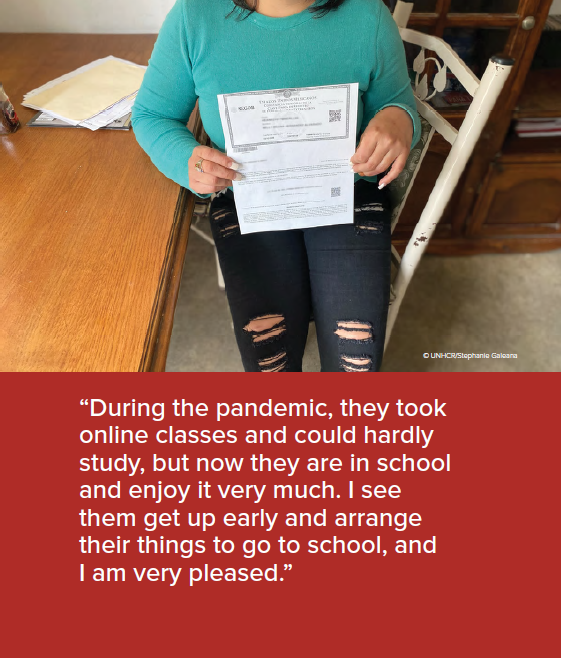Having IDs facilitates Salvadorian family’s access to employment and education in Nuevo León state
Obtaining an official government ID has changed María´s life, a 30-year-old Salvadoran refugee woman who lives with her husband and two teenage children in the state of Nuevo León.
By having the Unique Population Registry Code, better known as CURP, Maria and her husband have been able to access formal employment, she as a packaging operator in a meat processing plant, and he as a security guard. The CURP has also allowed their children to go to school.
“When I didn’t have the CURP, it was a bit difficult because they would ask for it everywhere, even for the children’s school, but now that I have it, it’s easier, I don’t have to struggle,” María said.
The CURP is used to individually register all persons residing in Mexico, nationals, and foreigners, to be part of the population registry, and is the key to access public programs and services.
Within the Comprehensive Regional Protection and Solutions Framework (MIRPS), the Mexican Commission for Refugee Assistance, the National Population Registry, and the Civil Registry of Nuevo Leon initiated a statewide pilot program that allows asylum seekers and refugees to obtain the CURP, prove their identity and access various services such as health, education, and employment. Maria’s family was among the first beneficiaries.
Before having the CURP, Maria said her children could enroll in school but did not have access to report cards. Today they have no obstacles, and her children are happy to go to school. The youngest, ten years old, wants to be a policeman and the 13-year-old dreams of becoming a doctor.
“During the pandemic, they took online classes and could hardly study, but now they are in school and enjoy it very much. I see them get up early and arrange their things to go to school, and I am very pleased,” she said.
Since December 2019, more than 700 CURPs have been issued to families and individuals that seek asylum in Nuevo León. The scheme has been replicated in Baja California and is expected to come into effect in the states of Mexico, Querétaro, Chiapas, Tabasco, Veracruz, Oaxaca, Puebla, and Coahuila.

